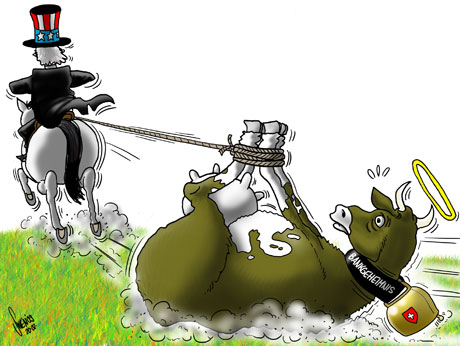Massive bank payout rekindles bonus debate

Banks are under renewed pressure over bonuses after Credit Suisse paid out SFr3 billion ($2.85 billion) to top managers from a share-based incentive scheme.
The scheme, dating back to 2005, saw managers receive an average of SFr7.7 million worth of shares with chief executive Brady Dougan pocketing SFr71 million. Critics point to another example of greed at top banks.
On Wednesday, Credit Suisse revealed details of how much the 400 investment bankers walked away with from its performance incentive plan (PIP). The figures were based on the value of the awarded shares when the scheme matured this year.
The bank pointed out that PIP was introduced before the financial crisis when it was reorganising its investment banking business and just after Dougan was made CEO of the division. Credit Suisse also said the scheme was pegged to long-term targets.
But these arguments failed to convince Thomas Minder, the Swiss businessman behind a people’s initiative to curb excessive pay and bonuses for executives. “This program [PIP] will result in even more support for my initiative than previously thought,” he told the Tages Anzeiger newspaper.
Observers have also pointed out that the Credit Suisse PIP scheme boosted the value of shares with a multiplier linked to the relative performance of other banks. In short, the shares were inflated as much by the poor record of rivals as the relatively good performance of Credit Suisse’s investment bankers.
Huge payouts
Other big winners from the PIP scheme are: Paul Calello, now head of investment banking, who made SFr37 million and Walter Berchtold, head of private banking, who received SFr34 million. Brady Dougan was already Europe’s best paid bank CEO in 2009 with SFr19 million in total compensation.
The crisis of 2008-9 sparked fierce criticism in Switzerland, as in other countries, about the size of bankers’ pay and bonuses. Only one Swiss bank, UBS, needed a state bail-out (SFr6 billion that was paid back last year), but that has failed to dilute the sense of public outrage at perceived greed in the banking sector.
Both Credit Suisse and UBS introduced new remuneration policies before they were obliged to do so by the Swiss financial regulator. Changes include a larger slice of bonuses being deferred, performance being linked to longer-term targets and the possibility of clawing back some, or all, of bonus payments if they are not met.
In addition, both big banks have joined a growing list of large Swiss companies to grant shareholders a consultative vote on compensation. However, Credit Suisse shareholders will not get an opportunity to vote on PIP as it was introduced five years ago.
Shareholder power
Credit Suisse is not the only Swiss bank that is likely to feel the wrath of shareholders at its annual general meeting.
UBS, which substantially increased its bonus pool to SFr2.9 billion last year despite still recording losses, could potentially find shareholders voting against its compensation report on April 14.
Sustainable investment firm Ethos, which advises many pension funds, has already indicated it will register a “no” vote, and the Swiss media has speculated that other large shareholders could also follow suit.
Ethos has also stated that it will oppose the discharge of senior bankers, including former UBS chairman Marcel Ospel, from their responsibilities of leading the bank from 2007 to 2009.
Unlike in Switzerland, some governments around the world do not appear satisfied to leave control of bank leadership to shareholders and regulators. France and Germany are among countries that have proposed a legal restriction of bonuses.
Politicians “stay away”
However, Nuno Fernandes, a professor at the IMD business school in Lausanne, has written that this would be a big mistake. He argued earlier this year that nationally binding regulations could distort competition and lead to less transparency as banks sought ways to get around them.
“Some compensation practices of the past were undoubtedly wrong,” he wrote in January. “[But] there is no evidence that option [share-based] compensation or bonuses had a negative impact on bank performance during the crisis.”
Fernandes said political interference would “not be desirable”, and that shareholders should be given the opportunity to rein in bad compensation practices. “In the future, publicly traded companies [should] give shareholders the opportunity to vote on the compensation of CEOs…as well as on some exit packages, known as golden parachutes,” he wrote.
Some Swiss companies have voluntarily agreed to a non-binding vote on compensation policies. Thomas Minder’s initiative, that will go to a nationwide vote, is calling for a further vote on board members’ pay and a ban on golden hellos and parachutes.
Matthew Allen, swissinfo.ch
Following the financial crisis and the bail-out of several banks around the world using taxpayers’ money, many countries are debating how to curb pay and bonuses in the financial sector.
Public, media and political criticism was sharpened at the start of this year when some banks, particularly in the United States, showed signs of returning to remuneration practices that showered vast sums of wealth on top employees.
France and Germany have gone so far as to propose legislative caps on bonuses. Switzerland, and other countries, have ruled out such an approach.
In the meantime, Switzerland, Britain, France and the Netherlands are among countries to negotiate compensation restrictions with banks.
The Swiss Financial Markets Supervisory Authority (Finma) introduced regulations at the start of 2010 that gives banks one year to start proving that their staff compensation practices do not encourage short-term risky behavior or compromise their stability.
Under the rules, part of the variable compensation would be held back for a number of years and could be clawed back if long-term targets were not met.
Financial institutions were also ordered to be more transparent about their compensation strategy.
Credit Suisse and UBS had already applied similar strategies before the regulations came into force.
The rules apply to the seven largest Swiss banks and five biggest insurance companies, but could be extended to other institutions if necessary.
In addition, several big company names in Switzerland have bowed to pressure from the Ethos Foundation to allow shareholders a consultative vote on remuneration policy.

In compliance with the JTI standards
More: SWI swissinfo.ch certified by the Journalism Trust Initiative






You can find an overview of ongoing debates with our journalists here . Please join us!
If you want to start a conversation about a topic raised in this article or want to report factual errors, email us at english@swissinfo.ch.